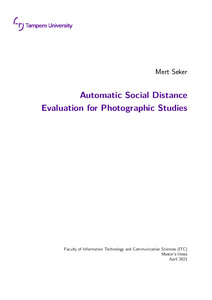Automatic Social Distance Evaluation for Photographic Studies
Seker, Mert (2021)
Seker, Mert
2021
Master's Programme in Information Technology
Informaatioteknologian ja viestinnän tiedekunta - Faculty of Information Technology and Communication Sciences
This publication is copyrighted. You may download, display and print it for Your own personal use. Commercial use is prohibited.
Hyväksymispäivämäärä
2021-05-18
Julkaisun pysyvä osoite on
https://urn.fi/URN:NBN:fi:tuni-202104273845
https://urn.fi/URN:NBN:fi:tuni-202104273845
Tiivistelmä
Starting from March 2020, the COVID-19 virus had a big global impact and it was declared a global pandemic since then. One of the most important safety measures for reducing the infection speed is keeping a safe social distance between ourselves and others. Social distancing is one of the recommended measures that the World Health Organization (WHO) officially provides. A minimum social distance of one meter is strongly recommended for safety. Due to these recent events, monitoring social distances for safety and for studying changes in human behaviour has become an important and relevant topic. It is clear that there is a need for automatically estimating social distances, however, test benchmarks that are suitable for evaluating such algorithms do not exist. It is a cumbersome and difficult effort to collect images under different camera settings while measuring the pair-wise distances between every person. Moreover, evaluating the performance of social distance estimation methods is not straightforward as there is no protocol for it that is widely accepted.
In this thesis, we introduce and provide a dataset that includes varying images where all of the pair-wise distances between the people were carefully measured. The pictures were taken under different locations, camera positions and focal length values. Along with the dataset, we also suggest a protocol for performance evaluation and a test benchmark to easily evaluate the performance of other methods that also estimate social distances. We provide a unique method that is used for automatically estimating social distances by taking advantage of advanced deep learning methods like human pose estimation and object detection. The method can be applied on regular single images, provided that the camera’s focal length and sensor size are known. The results of our method obtained on our suggested benchmark are promising with 28.9% average social distance estimation and 92% person detection ratio. Moreover, we discuss the meaning and importance of social distance in photographic studies and we explore how our unique social distance estimation method can be used to automatically analyze certain social behaviours of people from images. In that sense, the work proposed in this thesis is a multidisciplinary research that answers research questions related to computer vision, deep learning, pattern recognition along with photographic studies and social sciences.
In this thesis, we introduce and provide a dataset that includes varying images where all of the pair-wise distances between the people were carefully measured. The pictures were taken under different locations, camera positions and focal length values. Along with the dataset, we also suggest a protocol for performance evaluation and a test benchmark to easily evaluate the performance of other methods that also estimate social distances. We provide a unique method that is used for automatically estimating social distances by taking advantage of advanced deep learning methods like human pose estimation and object detection. The method can be applied on regular single images, provided that the camera’s focal length and sensor size are known. The results of our method obtained on our suggested benchmark are promising with 28.9% average social distance estimation and 92% person detection ratio. Moreover, we discuss the meaning and importance of social distance in photographic studies and we explore how our unique social distance estimation method can be used to automatically analyze certain social behaviours of people from images. In that sense, the work proposed in this thesis is a multidisciplinary research that answers research questions related to computer vision, deep learning, pattern recognition along with photographic studies and social sciences.
